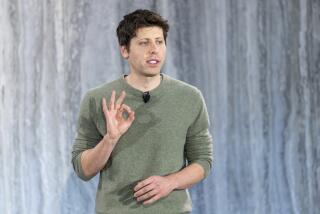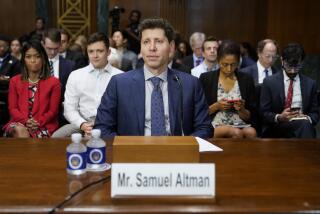Inman to Leave Joint High-Tech Research Effort : Ex-CIA Official Has Been Guiding Hand in MCC’s Drive to Match Japanese
- Share via
The Texas-based high-technology consortium that has been billed as this country’s chief answer to Japan’s advanced research efforts is losing its guiding hand and most zealous advocate.
Bobby R. Inman, former director of the National Security Agency and former deputy director of the CIA, told board members of Microelectronics & Computer Technology Corp. that he is stepping down at the end of this year as the Austin outfit’s chief executive.
The decision, which the board learned Wednesday but did not announce until Thursday, disappointed but did not surprise MCC directors, according to several board members.
No replacement has been named for the 55-year-old Inman, a retired rear admiral.
MCC is the “brainchild” of William C. Norris, the founder and now-retired chairman of Control Data. Norris drew together a small initial group of companies that worked to overcome antitrust objections and breathe life into the plan. But since Inman signed on in January, 1983, as MCC’s leader, the consortium has become more closely identified with him and his zealous style. Observers credited Inman with getting MCC off the ground and said Thursday that it is too early to tell what impact his departure will have.
Inman was traveling, MCC officials said, and could not be reached for comment.
Inman’s initial three-year contract was renewed last year for 1986, and directors were hoping he would stay another year, said George Scalise, a member of MCC’s board and executive vice president of Advanced Micro Devices. The current contract, which expires Dec. 31, would have been automatically renewed had neither side acted to terminate it by Sept. 30.
Scalise and other board members were effusive in their praise of Inman. Said John Lacey, chairman of the MCC governance committee and executive vice president of Control Data:
“I honestly believe that Bob Inman has taken us higher and faster than we had expected.”
Friends said they believed that Inman does not yet have a new job lined up. MCC’s official statement said he will pursue ways to achieve rapid implementation of technology by American industry.
Lacey said Inman thinks of himself “as a builder rather than a maintainer.”
Some observers believe, however, that participating companies--called shareholders--were anxious to see more results and benefits to their companies. Some researchers have said they were beginning to feel the pressure from the member firms to speed up transfer to them of meaningful technology.
MCC was wooed by dozens of cities eager to lure the high-technology enterprise and the professional employment base it required. Austin, backed by the wealth of the University of Texas, was selected in May, 1983. San Diego was a disappointed runner-up.
Inman excelled as MCC’s chief spokesman in the latter stages of the many angled courtship, drawing attention to America’s supposed second-place status in the race to develop a so-called fifth-generation computer, one that would incorporate artificial intelligence.
The goal of such a computer--a project begun by Japan’s high-technology consortium two years earlier--also helped drum up new participants for MCC. Now, 21 companies have joined the consortium--each paying millions of dollars a year to support the research. About 35% of MCC’s 454 employees are from the participating companies themselves.
But since the initial stages, MCC has taken on a much lower profile, and competition among the participating companies has intensified, according to some observers. The nature of the competition with Japan has inspired much of the secrecy, according to Sheridan Tatsuno, senior analyst at Dataquest in San Jose.
Others said that Inman’s style and intelligence background have shaped MCC into a university-like environment. But, said one, it has “save-the-U.S. overtones” and a military-secrets attitude toward its work.
More to Read
Sign up for Essential California
The most important California stories and recommendations in your inbox every morning.
You may occasionally receive promotional content from the Los Angeles Times.













